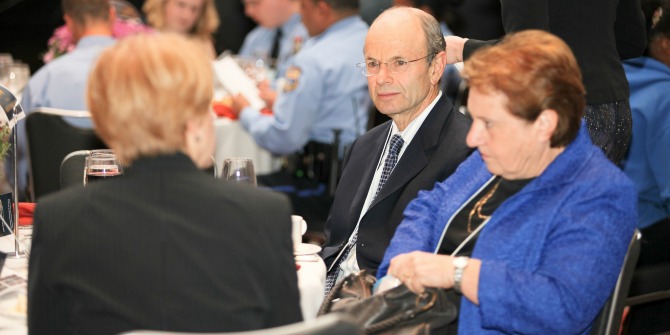
There have been many recent examples when personal politics has collided with professional workspaces. In November of 2016, Geoff Lewis, a partner at Founders Fund (a venture capital firm founded by Peter Thiel), penned a blistering critique of reality TV culture and the rise of Donald Trump. This article was posted just as Thiel, one of Trump’s highest-profile Silicon Valley supporters, was joining the president’s transition team. Lewis would eventually leave to start his own fund. A few months later, another intra-firm dispute over politics went public when a senior employee at Renaissance Technologies, a quantitative hedge fund, spoke out against his boss’s support for President Trump. That employee was fired and subsequently filed a wrongful termination lawsuit.
As company leaders have become more politically active this has also led to more employee displays of political affiliation. The above examples suggest that this trend has its risks. In a recent paper with Rory McDonald we explored the role that political ideology plays in organisations, and specifically, how it affects employees who do not fit.
There is a large body of academic research highlighting the importance of employee fit within an organisation on satisfaction and performance. Employee fit generally leads to positive outcomes, while misfit – when an employee is dissimilar to others in the organisation – generally leads to negative outcomes. Up until now, it has not been clear if organisational fit applies to political ideology, which is generally defined as an individual’s set of interrelated ideas about the proper order of society and how it should be achieved. This is an important characteristic because while political ideology is labelled at a collective level, it is also closely tied to specific psychological tendencies. Political ideology is also exceptionally stable, thus an individual is unlikely to become less of an ideological misfit over time within an organisation. Despite the power of political ideology, it is not a characteristic that is usually observable in most hiring situations. Most people avoid the discussion of politics at the onset of any workplace relationship. As a result, it is very likely for firms to inadvertently hire an ideological misfit into their organisation.
In our paper we develop the idea of ideological misfits — as individuals who hold a political ideology that is opposition of their employing organisation’s prevailing political ideology — and test to see how it is related to employee turnover. Using a dataset tracking the mobility of approximately 40,000 investment professionals in the U.S. private equity industry over a ten-year period we uncovered some surprising findings. While we assumed misfit would generally lead to negative outcomes, we find that under certain conditions, ideological misfits are actually less likely to depart their firms than individuals who share the dominant ideology of the firm. This effect is largely dependent on the direction of misfit as liberal misfits were less likely than the average employee to depart their firms whereas conservative misfits where more likely to depart.
We followed up our analysis with a series of interviews with investment professionals and found that both conservative and liberal misfits reported being marginalised; they offered similar accounts of inhospitable organisational climates, discomfort, feelings of detachment, and the like. But their reactions to this treatment differed. Conservatives reported greater sensitivity (and aversion) to misfit and expressed more rigid, negative attitudes toward their organisations—responses typically associated with increased likelihood of departure.
One associate we interviewed recounted an occasion when she expressed a minority viewpoint: “I was a fool for even thinking this group of my peers would respond well to my stepping outside their liberal frame. There are not heated debates at most firms like this. Instead, these interactions are avoided. On occasion, they come up by accident, but after every interaction, I left wishing I had not expressed my beliefs.”
A principal we interviewed expressed frustration that he and a conservative coworker “hardly ever” voiced their opinions. When misfits do share their viewpoints, he added, “it is with people they know well and who will not begin to misjudge them.” Both interviewees reported a lack of social cohesion and low attachment to their firms.
We were also curious why some ideological misfits are more likely than average to stay with their firms. We proposed two potential explanations. The first is that political ideological misfits are a type of “tempered radicals” — people whose identities conflict with those of their employers. For example, an avid environmentalist employed at a natural resources company that fights pollution regulation. Ordinarily, employees at odds with an organisation’s values would be expected to assimilate or leave. Instead, tempered radicals seek to reconcile such differences in order to embody both identities simultaneously — often by promoting incremental steps or supporting modest initiatives to effect broader change.
The second potential explanation is that ideological misfits serve as missionaries within their organisations. Much like religion, political ideologies can motivate evangelism whereby adherents try to persuade sceptics. As such, organisations with strong political proclivities or prevailing ideologies may appeal, somewhat paradoxically, to misfits because they offer opportunities for missionary work and mutual learning. The idea is consistent with one misfit vice president we interviewed who argued that his workplace “offers the chance for more impact: no better place to proselytise than in a place full of nonbelievers in the cause.”
With society becoming a more politically segregated, workplaces are one of the last places most people will experience ideological diversity. Our research suggests that sticking to the old adage to avoid speaking about politics at work may not be a tenable strategy for dealing with this problem. Instead companies should be proactive in monitoring the political climate among employees to make sure inclusivity policies and programs don’t exclude political ideology.
♣♣♣
Notes:
- This blog post is based on the author’s paper “Ideological Misfit? Political Affiliation and Employee Departure in the Private-Equity Industry”, with Rory McDonald, Academy of Management Journal, Volume 61, Issue No 6, pages 2182-2209.
- The post gives the views of its authors, not the position of LSE Business Review or the London School of Economics.
- Featured image by bzager0, under a Pixabay licence
- When you leave a comment, you’re agreeing to our Comment Policy.
 Y Sekou Bermiss is an associate professor at the University of Texas’ McCombs School of Business. He received a B.S. in chemical engineering at Rensselaer Polytechnic Institute (NY), and an M.S. and Ph.D in management and organisations from the Kellogg School of Management at Northwestern University. His research centres around how value is socially constructed in organisational settings. He investigates how market perceptions of financial performance, organisational identity, and human capital affect firm performance, reputation, and survival. His research has been published in various academic journals, edited volumes, and the press.
Y Sekou Bermiss is an associate professor at the University of Texas’ McCombs School of Business. He received a B.S. in chemical engineering at Rensselaer Polytechnic Institute (NY), and an M.S. and Ph.D in management and organisations from the Kellogg School of Management at Northwestern University. His research centres around how value is socially constructed in organisational settings. He investigates how market perceptions of financial performance, organisational identity, and human capital affect firm performance, reputation, and survival. His research has been published in various academic journals, edited volumes, and the press.





